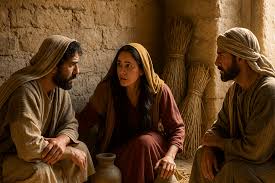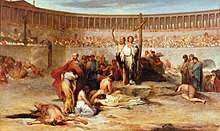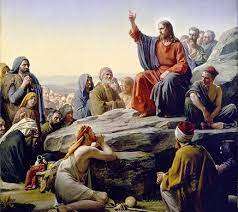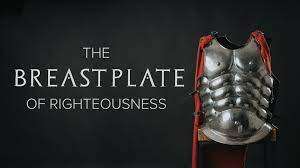

God’s Love for All People Evident in Accepting Rahab (Joshua 2)
Dr. Domenic Marbaniang
The acceptance of the prostitute Rahab into God’s kingdom in the Old Testament foreshadowed God’s greater plan for the world beyond the boundaries of Jewish identities. God not only saved Rahab from the destruction of Jericho but also placed her in the Messianic bloodline; she is one of the only women mentioned in Matthew’s genealogy of Jesus (Matt.1:5). The New Testament notes her as a woman saved and justified by active faith (Heb.11:31; Jas.2:25).
Prostitution was an abominable trade before God (Deut.23:17-18). No trace of it was to be found in the priestly bloodline. The high priest was forbidden from marrying a prostitute (Lev.21:14) and if a priest’s daughter was found engaging in prostitution, she was condemned to death by burning (Lev.21:9). Nevertheless, it is surprising that Rahab, after her rescue, became the wife of a prince’s son, the wife of Salmon the son of Nahshon a prince of Judah (Matt.1:4,5; Num.2:3). Nahshon’s sister Elisheba was the wife of Aaron the brother of Moses and the high priest of Israel (Exo.6:23). Incredibly, thus, God not only saved Rahab from destruction but justified her and crowned her with dignity and honor. She became a full member of the household of God.
When God accepts us home, His embrace overflows with love and genuine acceptance of us as children of God, regardless of how we feel or think about ourselves.
“So he got up and went to his father. But while he was still a long way from home his father saw him, and his heart went out to him; he ran and hugged his son and kissed him. Then his son said to him, ‘Father, I have sinned against heaven and against you; I am no longer worthy to be called your son.’ But the father said to his slaves, ‘Hurry! Bring the best robe, and put it on him! Put a ring on his finger and sandals on his feet! Bring the fattened calf and kill it! Let us eat and celebrate, because this son of mine was dead, and is alive again – he was lost and is found!’ So they began to celebrate.” (Luke 15:20-24, NET).
A retracing of Rahab’s journey unveils some interesting facts about her path to freedom and honor.
The first introduction we have of her is as “a prostitute named Rahab” (Jos. 2:1). She had a house located on the city wall (Jos. 2:15), easily accessible to the spies. It is significant that the Bible does not give us the names of these two spies, but it mentions the name of Rahab, implying her significance. We only know that these spies were young men (Jos.6:23) and probably notable ones. Some have speculated that Salmon, her future husband, was one of the spies. This is possible because, as the son of a prince, he might have been considered notable and trustworthy. But we can’t be sure of that. What we only know is that her decision to believe God and turn to Him on that day secured her an incredibly significant name and position in Messianic history.
God loves prostitutes
This might look like a shocker-statement to many; but it is true that God loves sinners, and they include prostitutes or “sex workers” as some wish to call themselves for self-dignifying purposes. God detests prostitution or “sex-work” but loves the persons caught up in the trade and desires to save and transform their lives. His love transformed Rahab the prostitute to Rahab a woman of faith.
In fact, not all women in the prostitution business like the work; many of them detest it but are bound to it. I once visited a worship gathering in a red-light area in Shillong which was attended by a few children and some of their mothers. The pastor told me that the prostitutes send their children to the church because they want their children to grow up to have better lives than theirs. These people could not have come to church by themselves; the church going out to them brought Christ’s love to their doors. The coming of the Israelite spies to Rahab’s house was certainly a ray of hope come home to her.
It was not a matter of chance, for sure. God foreknew and chose Rahab for salvation (Rom.8:29,30). Rahab confessed to the spies that she knew that the God of Israel, Jehovah, is the God in heaven above and on earth below and was handing this land over to them (Josh.2:11,9). In other words, she confessed her absolute faith in the true God. She was terrified of what would happen to her and her family when Israel invaded; this fear voiced out her inner cry for salvation and God saw that; for He seeks such God-fearers to be His worshipers (John 4:23). It was a not a matter of chance that God reached out to Rahab by guiding the spies to her house. She had heard the word, the story of God’s mighty acts, and she believed unto salvation (Rom.10:17); “For there is no distinction between the Jew and the Greek, for the same Lord is Lord of all, who richly blesses all who call on Him. For everyone who calls on the name of the Lord will be saved” (Rom.10:12,13).
When the self-righteous legalists and theologians of the day slandered Jesus for spending time with sinners, Jesus told them three parables of the lost sheep, the lost coin, and the lost son (Luke 15) to affirm God’s love for sinners and heaven’s joy when they are saved. He gives grace to the humble, who confess their sins and trust in Him, but resists the self-righteous proud ones (Jas.4:6; Lk.7:37-50).
Rahab proved her love for God by her faith-works
For a strict ethicist, it might appear irrational for either Rahab to engage in falsehood or for the two spies to demand of Rahab to not divulge the truth about their whereabouts to the Jerichoites. These don’t appear to be works of faith. If God is truly almighty, why would Rahab need to mislead the pursuers and why would the spies need to use this for their escape? Couldn’t God have saved the spies regardless of any of these tactics and methods? Of course, He could. Then, how could Rahab’s acts amount to total faith in God?
We must begin by understanding that not everyone has the same measure of faith. Secondly, sin is only sin when it is an act of offense against God. For instance, a person might be ethically spotless and faithful in all his acts, but if he is in the devil’s camp, a devil worshipper, all these acts amount to hatred towards God. The Jews who questioned Jesus appeared to be very religious and self-righteous, but Jesus called them children of the devil (John 8:44); in fact, they crucified Jesus. On the other hand, Rahab’s acts though misleading the Jerichoites, was in response to faith and trust in God, and so she was justified when she welcomed “the messengers and sent them out by another way” (Jas.2:25). The two men were spies to the Jerichoites, but to her they were messengers of God. Rahab’s decision to protect and securely send them away was as pure-hearted as that of the disciples in Damascus who rescued Paul from the murderous plot of the city Jews by lowering him down in a basket through an opening in the city wall during the night (Acts 9:25; 2Cor.11:33).
Her ultimate act of faith, however, was believing their word and tying the scarlet rope on her window that saved her household consequently. If she had been “super-spiritual” and over-righteous, she might have just sat at home carelessly thinking, “God is all-powerful, He does not require a scarlet thread to save me” and get destroyed. But she acted on her faith knowing that if she didn’t act according to the word, she could not be saved. Rahab did what best she could in her power to show her solidarity with the people of God and she inherited the promises of God by faith. She proved her love for God and His people through her works.
Rahab was wise unto salvation
There were many people in Bible times who knew the Bible and listened to the law of Moses and the writings of the prophets regularly, but never could be saved though the Scriptures were given to make us wise unto salvation (Lk.16:19-31; 2Tim.3:15). Rahab did not have a Bible, but she responded to the word of faith she received fully and wholeheartedly according to her proportion of faith. Though what she heard of was in bits and portions, her response of faith made her wise unto salvation. She not only wisely and shrewdly protected the messengers from the enemy’s search but also ably guided them on their route to escape by instructing them about the direction, hiding place, checks and duration of stops to evade the pursuers.
When the pursuers had come to her home searching, she took the two spies to the rooftop and hid them in the stalks of flax that she spread out there. That was certainly ingenuous. She was certainly an industrious woman as is obvious from the flax stalks she dried on her rooftop that were generally used to make linen fabrics (Prov.31:19,24). She was clearly conversant with the geography of the land, including places and distances. She also knew the psychology of the pursuers and calculated the amount of time needed between each stop of escape and provided excellent intelligence to the spies. She, though a harlot by trade, was smart, self-composed, confident, and courageous. But it was the fear of God in her that made her wise unto salvation (Prov.1:7), for the “beginning of wisdom is to fear the LORD, and acknowledging the Holy One is understanding” (Prov.9:10).
We have reasons to believe that this prostitute Rahab had already turned to God when she and others with her believed the news of God drying up the Red Sea and annihilating the two Amorite kings, Simon and Og, on the other side of the Jordan (Josh.2:10). The moment she acknowledged the Holy One, she had divine understanding.
The process of making linen from flax is not an easy one. The flax plant is pulled out along with its roots, then dried, beaten, scraped, and brushed until the soft fibers that form linen are extracted. So was Rahab. One of the phases of her life before she turned to God was prostitution, and she became known by the name “Rahab the prostitute” (Jos.6:17,25; Heb.11:31; Jas.2:25). There are some who suggest that the Hebrew word znh could also mean merely “innkeeper” rather than “harlot” or “prostitute”. But given the fact that the New Testament clearly uses the word porne (“a prostitute”) for her, we do not need further clarification on that. Thus, God did not justify “Rahab the innkeeper” but “Rahab the prostitute” when she believed in Him. This older profession marked her identity in the same way that associating with the Zealots (a religious terrorist group of the times) marked Simon the Zealot’s (Christ’s disciple). Yet the label was not a disparaging one but a mark of the grace of God; it did not belittle her, but was a testament of what God had done in her life when He transformed her from a prostitute to a mother in the bloodline of Christ.
If God could do that with Rahab, He can do that with anyone of us; His lovingkindness has no limits, enduring forever.


























